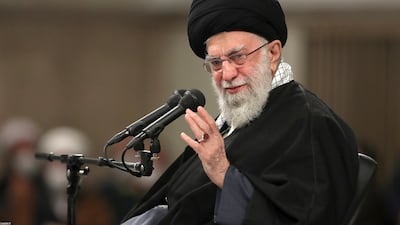Iran's supreme leader Ayatollah Ali Khamenei called the poisoning of schoolgirls across the country an “unforgivable crime” in his first comments on the issue that has fuelled anger against the government at home and abroad.
Speaking at a tree-planting ceremony at his office, Mr Khamenei said authorities “should seriously pursue the issue of student poisoning”.
“This is a big and unforgivable crime,” he said in comments published by state media.
“If it is proven that the students were poisoned, the perpetrators of this crime should be severely punished. There will be no amnesty for these people.”
Reports of poisonings at girls' schools began five months ago as nationwide anti-government protests surged following the death in custody of Mahsa Amini, a young woman arrested by the morality police in September.
More than 1,000 schoolgirls have been affected, according to officials, with new cases reported on Saturday.
Supporters of the protest movement have accused the government, and specifically the Islamic Revolutionary Guard Corps, which answers only to Mr Khamenei, of being behind the poisonings.
On Wednesday, President Ebrahim Raisi ordered an inquiry into the poisonings.
Footage posted on social media of suspected victims shows girls crying, screaming and coughing, with many struggling to breathe.
An Iranian journalist who reported on the poisonings, Ali Portbatabei, has been arrested, Radio Farda reported on Monday.
He lived in Qom where more than a dozen schoolgirls were taken to hospital after a suspected poisoning attack in November.
Also on Monday, Iran's judicial chief said each province would open an office to summon “people who spread lies” about the poisoning cases, saying people “aligned with the enemy” would be “severely punished”.
Schoolgirls, many of whom have openly defied the regime during the anti-government protests, have been the targets of security forces leading the crackdown on the demonstrations.
A schoolgirl died in October during a raid on her school in Ardabil, where teachers said students were attacked after chanting pro-protest slogans.
Teenage girls have also been brutally killed by security forces while protesting in the streets, such as the case of Nika Shakarami.
A group of Iranian medical professionals in the US and Europe have urged international organisations to investigate what they described as “premeditated attacks” by the regime “using substances that are applied in chemical warfare”.
“As physicians, we view this crisis in Iran as a potential mass casualty scenario,” they said in an open letter shared on social media.
“The Islamic Republic appears to be incapable or unwilling to manage this disaster,” the letter continued, saying regime officials “either deny or downplay these disturbing occurrences”.
Judiciary chief Gholamhossein Ejeni has also threatened tough action against women who breach Iran's strict dress code, repeating its hardline stance that has provoked unprecedented anger against authorities.
Measures will soon be taken in co-ordination with security forces against people disobeying “public modesty” laws that require women wear a headscarf in public.
“You will see the result,” Mr Ejeni said in remarks carried by the judiciary's Mizan news agency.
The death of Ms Amini, who died while in police custody for allegedly wearing her hijab too loosely, was the catalyst for the popular protests that erupted after her funeral in western Iran.
The protests spread across the country, with women bravely taking to the streets with no head covering to protest against their widely curtailed freedoms, which extend from dress code to being unable to travel out of the country without permission from a male guardian.
Several people have been executed and more than 18,000 people imprisoned for participating in the movement.


